- Home
- William Goldman
Adventures in the Screen Trade Page 3
Adventures in the Screen Trade Read online
Page 3
Stories of star misbehavior have been a part of the Hollywood legend, I suppose, from the time Florence Lawrence first got billing. When they occur, they spread through the community with amazing speed. One is apt to hear the latest anecdote half a dozen times within a day of its taking place. Here are four. (I have named names in only two, not because I delight in being "hinty," but because the performers involved have recently died.)
One: A crucial beach scene is being shot. A cabin has been built on the sand and the weather, for reasons of plot, has to be brilliant sunshine. The setup involves the male star of the picture.
The first day--fog. No shooting at all. Just a lot of frustration and a great waste of money.
The second day--fog. Again no shooting, and now the frustration is turning sour. The whole crew is sulking, the director is being eaten alive by the studio over costs.
The third day--yes, fog again, but this time it seems to be lighter. And as the hours drag on, at long, long last, there seems to be a definite chance to shoot. If the fog will only continue to burn away.
Hours pass. The sky is definitely brightening and the crew races for position. They stare at the sky, literally praying for sunshine.
Finally the sun breaks through for a moment--
--and precisely at that moment the male star jumps into a dune buggy and goes for a long ride down the beach. The entire crew turns toward the director and on their faces he sees their message: Do something.
The director, helpless, turns away from the crew, stares out at the ocean, and cannot stop the tears of frustration from streaming down his face. (He swore, as he stood there, never to work with a star again.)
The sun goes away, the fog returns. So does the male star half an hour later. He hops out of the dune buggy and can't understand why everyone seems so unhappy....
Two: Rehearsals of Marathon Man in New York. Dustin Hoffman and Roy Scheider are about to rehearse their first scene together. Hoffman has the vehicle role and is the more important of the two, but Scheider, coming off the lead in Jaws, is not chopped liver.
In the story, they play brothers. Hoffman is a graduate student. Scheider, whom he adores and thinks is in the oil business, actually works for the government as a killer and a spy.
Hoffman has just been brutally mugged in the park. He has written this to Scheider. Scheider suspects it was not an accident--bad guys are trying to get at him by threatening his kid brother. So he comes down from Washington to visit.
It's night, and Hoffman is asleep. Suddenly, he realizes he's not alone in his apartment, so he grabs a flashlight from his bed table and points it around the room, trying to catch the intruder. As he does this, he has a line of dialog:
HOFFMAN
(very James Cagney)
I got a gun, you make a move,
I'll blow your ass to Shanghai.
Okay, rehearsal. A mock set is prepared. Hoffman lies down, closes his eyes, Scheider mimes opening a door, bangs his foot down to indicate the closing of the door, and Hoffman springs awake, mimes getting the flashlight, and says his Shanghai line.
Then rehearsals stop.
Hoffman says to hold it and he turns to the director, John Schlesinger, and tells him that he thinks it wrong for his character to have a flashlight in his bed table.
Schlesinger tells him we'll get to it later, let's continue rehearsing the scene, please.
Hoffman shakes his head. The character that he is playing, he feels, would not have a flashlight by his bed.
Now, if this had not been a star complaining, Schlesinger or any director would have told him that they were wasting rehearsal time, which was gold, since most movies don't bother with rehearsal. (The studios don't like it, they can't see rushes the next day, they consider it a waste of money. I think they're wrong--rehearsals save money, because you can work out problems without the intense pressure of a crew standing around doing nothing. Studios are, in this case, like the late Sam Goldwyn, who used to creep to the writer's building on the lot and was unhappy if he didn't hear typewriters clicking.)
But Dustin Hoffman is very much a star, and he has to be dealt with. Scheider stands quietly in the imaginary doorway, waiting.
A lot of people have flashlights by their bed tables, Schlesinger tries.
Hoffman isn't playing a lot of people, he is playing Babe and Babe wouldn't have a flashlight by his bed table.
Schlesinger makes another attempt: You've just been mugged, you're upset, you're taking precautions.
No sale.
Now a practical assault from the director: We need the effect of the flashlight beam bouncing off the walls to add interest to the scene.
Hoffman replies there won't be any scene worth anything if he can't play it, and he can't justify the goddam flashlight.
Through all this, silent and waiting, stands Scheider.
And that is probably my strongest memory of the situation--it took an hour, by the way--Scheider, waiting quietly, a perfect gentleman through it all.
Now, as stated, rehearsals are meant to deal with problems. And Hoffman is not only one of the best actors we have, he is also known to be a perfectionist. And maybe in his preparations he really couldn't figure out why his character would have a flashlight in his bed table.
But that sure wasn't my feeling in the rehearsal hall at the end of the day. Rather it was this: Hoffman was perfectly able to justify anything, he is that skilled; in my opinion, he didn't want the flashlight because he was afraid his fans would think him chicken.
I believed that then and still do. But that is the kind of thing one dares not mention to a star.
Three: A movie is shooting on a Hollywood sound stage and the female star is number one in the world. By half past nine, the first setup is ready. The star is in her trailer and the second assistant director goes about one of his functions: delivering the talent from the trailer to the set.
He knocks on the trailer door and says "Ready." Pause. Then the star's hairdresser appears in the doorway and says the star is not ready. (Rule of thumb: Female stars are closer to their hairdressers and makeup people than to anyone else on the set. Male stars tend to buddy around with their makeup and wardrobe personnel.)
Anyway, the second assistant returns to the set with his message: The Lady is not coming. The director is sitting in his chair, waiting. They decide to give her a few minutes.
A few minutes pass. Now the first assistant director knocks on the trailer door. Again the hairdresser appears and says the same thing. The first goes back to the director and tells him: "She won't come out." (I think, by the way, that this may be my favorite star story. Sure, it's outrageous, but eventually it gets funny and, strangely, human.)
Now the director sits in his chair and begins to ponder. She won't come out: Why?
The obvious answer hits him: script trouble; she doesn't like the scene she's going to play. He contemplates that awhile. He opens the screenplay, reads the sequence--
--she has told him she likes the sequence.
Can't be script trouble.
He thinks some more. Of course, he could have gone to the trailer himself at this point, but he felt that would be wrong. First of all, there's protocol going against it--it's not his job to escort talent to the set. The director is boss on the set. That's where he belongs. Beyond protocol there lies the subtle and always shifting balance of power. If he goes to get her now, he's giving in. Just a little, but still. And if he gives in a little today, who knows how much he'll have to give in tomorrow.
But dammit, why won't she come out?
She's the female star, and not unknown for outbursts, but this is not the kind of thing she ordinarily does.
And now the real answer comes clear: She won't come out because of his not letting her see the dailies. They had had words about the problem before shooting. She always saw dailies to her pictures, but he didn't want her to.
For the following reason: As famous as she is, she is insecure about her looks, and after vi
ewing dailies the first week, she is notorious for having the cameraman fired.
The director didn't want to deal with that problem, so before he took the picture, when they met, he suggested that she be the cameraman. She said she didn't know how. He told her, well, let's hire the best man available who does know how and let him do his job.
She asked are you saying I can't see dailies?
He replied that that was the case.
Now, she is powerful and he could have been discarded. But she gave in. Because (1) she wanted him to do the picture and (2) he was young and hot and he didn't care if he did the picture or not.
Time is passing. Word reaches the picture's production office that nothing is going on. The star is entrenched in her dressing room and won't budge. The production office calls the head of the studio. The head of the studio calls his top vice president and says go handle this.
So the top vice president goes to the trailer and knocks, announcing himself, and opens the door--
--except he can't, because now it's locked.
And from inside comes the voice of the hairdresser saying the star is not ready and won't come out.
The top vice president trots back to the office of the studio head and the studio head himself decides to get everything back on track.
But she won't unlock the door for him either. There is only the voice of the hairdresser saying "Not now."
At which point the head of the studio, his top vice president, the production manager of the movie, and various other notables gather around the director, who is sitting as before, waiting in his chair.
Roughly, their message is this: It's your ass if you can't get her out of her trailer and onto the set. So the director goes to the trailer and knocks, giving his name.
Go away.
It's me, he says; let's talk.
Long, long pause. Then there is the sound of the door being unlocked and the hairdresser opens it and beckons and the director goes warily inside.
Where his star is silently crying her eyes out. As he moves toward her she falls into his arms and collapses, wailing now. He holds her--for five minutes he stands there with her limp in his arms, weeping out of control.
And in those five minutes the director realizes that he has been wrong about the script and wrong about the dailies. This kind of grief can only be caused by one thing: Her marriage had shattered. She had been secretly seeing another performer and obviously her husband had found out and her husband had guided her career and now it was all pfft.
The director tries to calm her. "It's all right. Just take it easy, I'm on your side. We can talk about it. Whatever you tell me, I'm on your team, believe that." On and on he goes and on and on she cries. But eventually the sobs lessen; she is regaining at least the start of control.
He holds her, gently reassuring her. Finally, she is able to talk. He asks her if she feels up to going into the problem.
She nods.
Good, he says, what happened?
And then, haltingly, she gives the secret to her torment: Her toy poodle died the night before.
The director, an animal lover, tells her he understands.
No, you don't, she says; you don't understand at all. He died eating.
Eating?
Now she is crying again but able to talk. And her poodle did not die of kibble or Ken-L-Ration. Rather, as a treat, she had given him a great big juicy lamb chop for dinner and gone away and let him enjoy it.
The dog, apparently overcome with its good fortune, enjoyed it too quickly. He choked on the bone and nothing the star or her veterinarian did could bring him back. Not only has the star lost her pet, it's her fault--she had no business giving it a lamb chop in the first place.
The next little while the star and director talked about the dog and what a loss it was, and the director remembers thinking that all the terms they used were as if they were talking of a dead child. It was insane, but it was undeniably sad. Or it was sad, but it was undeniably insane.
Eventually, he got her to leave the trailer. But it was hours before the makeup people could hide the damage done to her face by her tears....
There were no tears shed in this fourth and last behavior story. It was angry and it made many newspapers. The story was never denied. That doesn't make it any less gossipy, but it does suggest that the incident may well have happened.
The surprising thing to me is that it concerned that most professional of stage stars, Al Pacino. Of all the stars, he is the one who most consistently returns to the theatre and whom I find consistently brilliant. Theatre is still run on fairly strict lines: If you're late or you miss performances, word spreads immediately, almost always to the detriment of the show, sometimes damaging it to the point of closing.
Anyway, Pacino was making Author! Author! and the company was shooting an exterior scene in Gloucester, Massachusetts. In the winter.
The windchill factor was way below.
The whole crew was ready for the shot. Ready and waiting. Pacino stayed in his trailer for over an hour. When he finally emerged, he walked into the setup and decided he didn't like the lighting. Something about it reminded him of the lighting from an earlier film of his, Cruising. He wanted the lighting changed.
Arthur Hiller, as gentlemanly a director as any now operating, exploded. He told Pacino he was thoughtless and that a hundred people had been waiting in subfreezing weather. He said all this strongly.
Pacino responded strongly in kind, told Hiller off, gathered up his entourage, then plunged into his limousine and was gone. (He returned hours later, when it was no longer possible to do the shot.)
Now, I have no idea what this action cost the film. Maybe a hundred thousand dollars. I would think at least fifty. Whatever it set the picture back, you can bank that the money was not made up for out of Al Pacino's multimillion-dollar salary.
Temperamental stars affect screenwriters only tangentially. On occasion, if a star is too difficult, a studio may choose not to get involved with him even though he or she may be ideal for the script you've written. More often, if a poisonous atmosphere invades the sound stage, if crucial people are not speaking to each other except through intermediaries, the quality of the film can be affected. This is no law--some of the happiest sets produced the unhappiest results, and vice versa. It may not hurt your movie, but it probably won't do it a whole lot of good either.
Some stars do misbehave, in infinite ways, but always for the same reason: They do it because they can....
REYNOLDS, EASTWOOD, AND STALLONE
Burt Reynolds and Clint Eastwood are not just the biggest stars in America (and probably the world), they are a good deal more. With the results of the '81 Quigley poll, they are setting popularity records that far exceed Gable or Cooper or Grant or just about any other movie star.
Reynolds was voted the top star for the fourth consecutive year. Only Bing Crosby had held the number-one spot longer--he had lasted five years--and the way Reynolds's career is going, I will be surprised if he doesn't tie Crosby when the '82 results are available.
Eastwood's record is equally remarkable: He has now been one of the top ten stars for fourteen years in a row. John Wayne has held a consistent hold on the public's fancy longer--sixteen years. But since Eastwood seems more at ease with himself than any other star, again, I will be surprised if he doesn't surpass Wayne three years down the line. Reynolds and Eastwood are genuinely phenomenal.
So, in a somewhat different way, is Sylvester Stallone. The success of Rocky (then without the roman numeral) lifted him from as much obscurity as any talented actor wants to deal with, to the top popularity spot in the country--he was number one in 1977.
Then came F.I.S.T., a big-budget film and a disappointment. Followed by Paradise Alley (which he also directed)--a disaster, but at least a low-budget one. Then Rocky II. And this past year, two films: Nighthawks was another big-budget film and another disappointment. Most recently, Victory--expensive and a total wipeout. This year's Quig
ley poll doesn't even list Stallone in the top twenty-five stars, much less the top ten. And what is his reward for this career in which he has demonstrated four times in his last five outings that there are no multitudes waiting out there to receive him?
Ten--million--dollars.
For that is the amount Stallone is being paid to write, direct, and star in Rocky III. Have you ever heard such madness? Can you believe that figure? Probably the largest amount of money ever paid a performer in the entire history of the civilized world. Isn't that insanity?
Me, I think it's a steal.
To try and make sense of that, I must now deal with the major exception that I mentioned in the first sentence of this discussion on stars.
WHAT IS THE MAJOR EXCEPTION?
Well... it's... it's something.
I mean it's there, it's just hard to isolate. And "something" may be about as close as I'm going to come.
Paul Newman, in discussing the careers of European versus American stars, put it this way: "One of the difficult things is that American filmgoers seem less able and willing to accept actors or actresses in a wide variety of roles--they get something they hook on to and they like, and that's what they want to see."
In the case of Stallone, they could care less about him as a labor leader or a soccer goalie. But let him be Rocky Balboa, the pug, and they'll stand happily in line for hours.
As I am writing this chapter, it is March and Rocky III won't be out till summer. I haven't seen it, haven't heard boo about it. But I don't just think it's going to be a hit, I wouldn't be surprised if it turned out to be bigger than the original. My reason isn't logical, but of all the sequels of recent years, Rocky II came closer to being a remake than any other. It was the same song, second verse, except this time the final decision of the fight was different. My guess is that Stallone, being the shrewd and skilled writer that he is, will ring in some innovations this time. (By the time this book comes out, Rocky III will probably be on cable, but I won't change this paragraph under any conditions. So we'll see what kind of studio executive I'd make.)
And though Stallone may be an extreme example, the same kind of point can be made about our two biggest stars. Eastwood has to beat up on people. When he doesn't, as in The Beguiled or the more recent and very sweet Bronco Billy, a film that he also directed, the audience is considerably smaller. Bronco Billy, for example, attracted less than a third of the audience than the Eastwood film that preceded it, Any Which Way You Can. Clint Eastwood is really only Clint Eastwood when he's the toughest guy on the block.

 The Princess Bride
The Princess Bride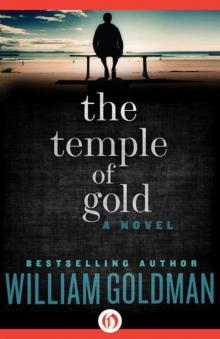 The Temple of Gold
The Temple of Gold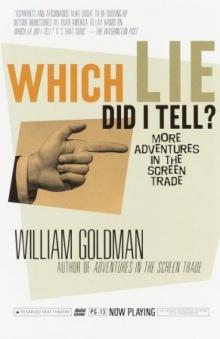 Which Lie Did I Tell?: More Adventures in the Screen Trade
Which Lie Did I Tell?: More Adventures in the Screen Trade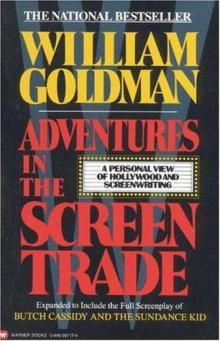 Adventures in the Screen Trade
Adventures in the Screen Trade Marathon Man
Marathon Man The Novels of William Goldman: Boys and Girls Together, Marathon Man, and the Temple of Gold
The Novels of William Goldman: Boys and Girls Together, Marathon Man, and the Temple of Gold Boys and Girls Together: A Novel
Boys and Girls Together: A Novel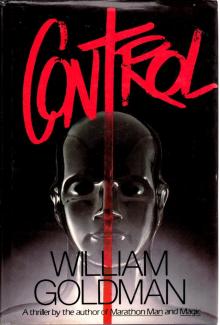 Control
Control The Novels of William Goldman
The Novels of William Goldman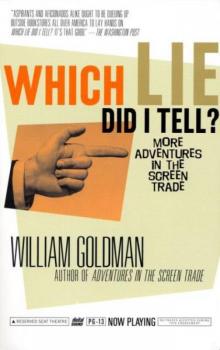 Which Lie Did I Tell?
Which Lie Did I Tell? Boys & Girls Together
Boys & Girls Together